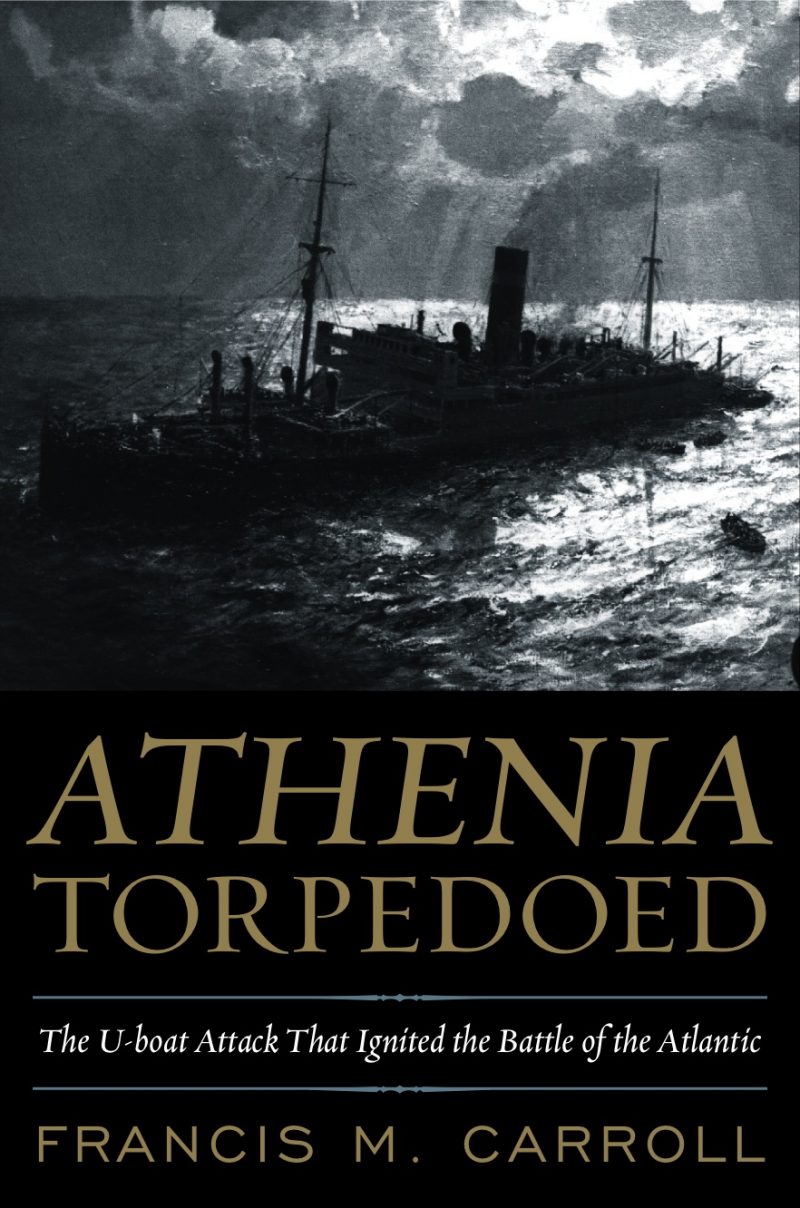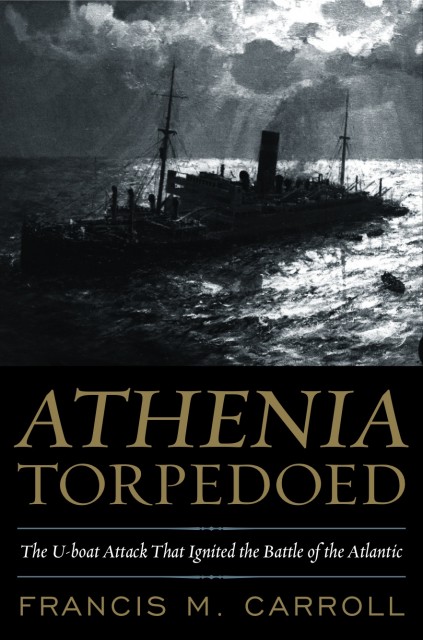ATHENIA TORPEDOED
The U-Boat Attack That Ignited the Battle of the Atlantic
By Francis M Carroll
Pen & Sword Maritime
ISBN: 978 1 78149 171 0
Review by Mark Barnes for War History Online
The war between Britain and Germany was just a few hours old when the submarine U-30 torpedoed the Athenia. The Nazis, in their wisdom, spent the next six years denying it but it was pretty obvious and fantastical claims that the British were perfidious enough to sink the ship themselves never stood up except in the minds of a pro-German and Anglophobic element, especially in the pre-Pearl Harbor United States.
The sinking of the Athenia cost the lives of over a hundred people, a fair number of them women and children and more importantly for the politics of the time, many were American citizens sailing away from the European war. There was speculation that the disaster would have a Lusitania effect on opinion in the USA, comparing it to the outrage following the sinking of the famous liner by the U-20 in 1915. There might indeed have been some parallels, but whether he wanted to be in the war or not, and he didn’t; Roosevelt would never have had the support of all his cabinet, much less Congress. It was a non-starter, but it filled newspaper columns at the time. Things would change.
The survivors were gathered from the sea by a number of means and returned to Britain either directly or via neutral Ireland. Many more sailed directly to North America aboard the City of Flint a ship blessed with a stunning captain and crew who were in the right place at the right time. The good people of Galway and Glasgow welcomed the bedraggled survivors with open arms and brought a credit on themselves and their cities which should never be forgotten. Among the Americans sorting out the mess for his countrymen in Glasgow was the ambassador’s son, John F Kennedy. He proved his worth there and laid the foundations of the qualities that would see him into the White House decades later. Among the many important and interesting survivors was the young James Goodson who would become one of the outstanding American airmen of the war. His book Tumult in the Clouds remains a favourite of mine and begins, pretty much, with his adventure on the Athenia.
Among the rescue ships was the destroyer HMS Electra. She did sterling work and this would continue throughout her service. She was with the mighty Hood when she was lost and rescued the three survivors. She went out East with the Repulse and Prince of Wales and stood off the sad and some say jinxed new battleship as she lay impotent, almost dead in the water; sinking under the assault of Japanese bombers. The only pictures of the demise of the Prince of Wales were taken aboard Electra.
She herself was lost in the Java Sea in 1942.
The outstanding naval figure of the story is Captain Joseph Gainard of the City of Flint. He was a man possessed of all the qualities that make the quiet unassuming yet brilliant heroes we admire so much. The US Navy had the sense to name a ship after him and the liner incident aside he had a busy career at sea in two wars that are worthy of a story in their own right. He is the classic American hero and this book helps put him back in mind’s eye.
The U-Boat that sank the Athenia was commanded by Fritz-Julius Lemp. His boat had been sent to the Atlantic in advance of the attack on Poland and was in the right place at the wrong time. His decision to sink the liner set in motion the introduction of the convoy system. The Battle of the Atlantic was about to begin. Although he was feted in Germany and went on to be a recipient of both the Iron Cross and Knight’s Cross; he had caused the Nazi regime an enormous headache by sinking the liner. But as we have seen, a confusion of accounts of the sinking allowed the Nazis to play dumb and claim the Brits had done it to themselves. Lemp died commanding the U-110 and drowned swimming about in the ocean when the heroes of HMS Bulldog entered his abandoned submarine and retrieved her Enigma machine and code books, changing the course of the war in the most vital of ways.
Where are all these dry facts leading us? The fact is the Athenia is a bit of a Kevin Bacon in a game of connections. On that note we could sneak in the fact that the infant daughter of the prolific and respected film director Ernst Lubitsch survived the disaster. My wider point is to illustrate the superb standard of research carried out by the author to produce this very entertaining book. He covers all the bases and really gives us a full broadside of facts and eye witness statements. The affect is to tell a story that cracks along with complete confidence and takes, us, the reader with it. I’ve been keeping this book on my “to do” shelf as a kind of supersub (from the seventies soccer analogy) waiting for the moment to throw it in the mix. That time is now.
The Canadian author is a prolific writer and academic and his experience and quality shines through. This is masterful story telling and I love this book. The loss of the Athenia was like an overture for the storm to come and it is an important story. It takes us into the uncertain atmosphere of a curious and fearful world just at the moment when the wheels came off. I like the fact this book has very much a New World perspective. It is refreshing and is probably the basis of what makes it so good. You should read it. You will not be disappointed.
~Mark Barnes

